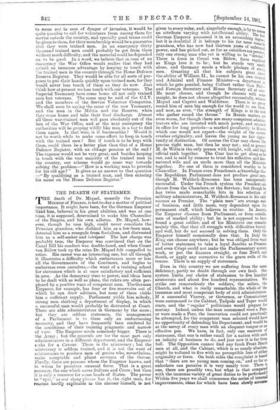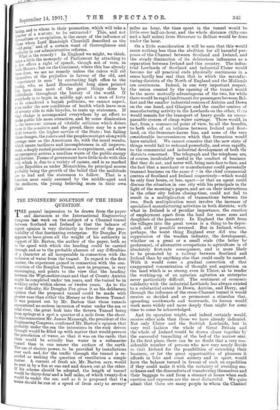THE DEARTH OF STATESMEN. T HE death of Dr. Miguel, recently
the Prussian Minister of Finance, is not to-day a matter of political importance. It might have been, for the German Emperor liked him, believed in. his great abilities, and was at one time, it is supposed, determined to make him Chancellor of the Empire, and his own adlatus. Dr. Miguel, how- ever, though be rose high, could never conciliate the Prussian grandees, who disliked him as a low-born man, detested him as a renegade from Socialism, and distrusted him as a self-seeker and intrigami. The last charge was probably true, the Emperor was convinced that on the Canal Bill his conduct was double-faced, and when Count von Billow took up the reins Dr. Miguel felt compelled to retire. His career was an interesting one, but all through it illustrates a difficulty which embarrasses more or less all the Governments of the Continent, and begins to embarrass even ourselves,—the want of a training school for statesmen which is at once satisfactory and sufficient in area. As the democracy rises to power, 4,4a ideas_ bare_ to be dealt with as well as plans, the rulers are often per- plexed by a positive want of competent men. The German Emperor, for example, has four or five reservoirs out of which he can draw advisers, but none of them yields him a sufficient supply. Parliament yields him nobody, Strong men shirking a department of display, in which a. successful man would probably be distrusted at Court. There are able administrators in Germany by the score ; but they are seldom statesmen, the management of a Parliament is to them only an embarrassing necessity, and. they have frequently been rendered by the conditions of their training pragmatic and narrow of view. The Emperor needs somebody bigger. There is the Army ; but the generals are for the most part only administiators in a different department, and the Emperor szeks for a Ca.vour. There is the aristocracy ; but the aristocracy is seldom trained, and it is not the wont of aristocracies to produce men of genius who, nevertheless, make acceptable and pliant servants of the throne. Finally, there are persons whom the Emperor knows, and in whom he perceives unusual force. That is a great resource, the one which saves Sultans and Czars ; but then it is only a resource for some heads of States. The power to "spot.," as our slang phrase has it, the right man, for reasons hardly explicable to the chooser himself, is not given to every ruler, and, singularly enough, is by ne an attribute varying with intellectual ability. The--"ti German Emperor possessed it in an astonishing a„fir'l but it is doubtful if it belongs. to his far in grandson, who has now had thirteen years of unfettertel power, and has picked out, so far as outsiders can per only one strong man who yet is willing to be e devotele.; There is force in Count von Billow, force regu as Kings love it to be ; but he stands very near!, alone, and Germany needs a whole phalanx of *v.. men. Granting all that his subjects grant 0;11', the ability of William II., he cannot be his own G ; and Admiral and Finance Minister—a department which he gets puzzled, being Colbert rather than peel_ and Foreign Secretary and Home Secretary all at onc. He must choose, and though he chooses with Some insight, he does not choose altogether successfully, witne, Miguel and Caprivi and Waldersee. There is no group round him of men big enough for the world to see theni and now, as ever, "the strength of Kings is in the mei; who gather round the throne." In Russia matters are even worse, for though there are many competent adminis trators who are invested with much power, and retained in office for long periods—a marked peculiarity in Russia which one would not expect—the weight of the system crushes originality, and leaves the young no fair oppor- tunity of distinction. Of course the Czar may choose the precise right man, but then he may not ; and at present M. de Witte is the only person with insight, will, and high official rank together. The Czar has to get along as he can, and is said by rumour to trust his reflective and fine. natured wife and an uncle more than all the Ilinisters together. No one of them is considered worthy to be Chancellor. In France even Frenchmen acknowledge that. the Republican Parliament does not produce great men, though M. Waldeck-Rousseau has been unexpected]y successful. Under the French system the President can choose from the Chambers, or the Services ; but though he has twice made remarkable hits in his selection of military administrators, M. Waldeck-Rousseau is his only success as Premier. The "plain men" are average men of business, and little more, very dependent upon the permanent staff, which believes in routine. In Austria the Emperor chooses from Parliament, or from outside, men of marked ability ; but he is not supposed to have found a great soldier, and of his Ministers one remarks mainly this, that they all struggle with difficulties bravely and well, but do not succeed in solving them. Only the Emperor himself occasionally does that. In Italy the King can choose anywhere ; but he was obliged from want of better statesmen to take a loyal Jacobin as Premier, and even Crispi could not make the Parliamentary system work, or put the finances straight, or fuse North and South, or apply any corrective to the grave evils of the tenure. There is no supply of statesmen.
Even in this country we are suffering from the same deficiency, partly no doubt through our own fault. Our system. limits_ our choice of statesmen to five hundral aristocrats and about five hundred representatives. We strike out remorselessly the soldiers, the sailors, the Church, and what is really remarkable, the whole of the immense and most competent body of civil administrators. If a successful Viceroy, or Governor, or Commissioner were summoned to the Cabinet, Tadpole and Taper would stare, and the " regular " politicians would prepare for mutiny. Indeed, unless the man summoned were a Peer, or were made a Peer, the innovation could. not practically be attempted, for the competent man selected would have no opportunity of defending his Department, and would be at the mercy of every man with an eloquent tongue or an effective pen. We have, in fact, only one reservoir of statesmen, that one is rather small for a nation with such an infinity of business to do, and just now it is far from full. The Opposition cannot find any fresh Front Bench men at all, and the Cabinet, which is so nearly absolute, might be reduced to five with no perceptible loss of either originality or force. On both sides the complaint is heard that "there are no young men coming on," and so far as onlookers can perceive it is very nearly true. There is one, there are possibly two, but what is that compared with the immense variety of great duties to be perform Within five years we shall commence the series of internal improvements, ideas for which have been slowly accumu• Wing, and to whom is their promotion, which will take a of a century, to be entrusted ? This, and not v°uritism or co-optation, is the cause of the influence of ;-here whom Lord Randolph Churchill described as the old gang, and. of a certain want of thoroughness and -" eid.city in our administrative reforms. What is the remedy? In England we might, we think, relax a little the monopoly of Parliament by attaching to a few offices a right of speech, though not of vote, in. both Houses; but on the Continent, where this has already leen done, we see no remedy unless the rulers will rid themselves of the prejudice in favour of the old, and experiment in men" by entrusting high office to the „erne, who, as Lord. Beaconsfield long since pointed 'rut, have done most of the great things done by individuals throughout the history of the world. If everybody is to begin in -middle age, and a man of forty to be considered a boyish politician, we cannot expect, even under the new conditions of health which leave men of seventy able to ride bicycles, to train up statesmen. If that change is accompanied everywhere by an effort to make public life more attractive, and by some diminution it, the incessant stream of vitriolic criticism which deters fit= it the sensitive and the .proud, there may be a. new (hilt towards the higher service of the State ; but failing these changes, the rulers and. the peoples mustget along with average men as the Americans do, with the usual results, which means tardiness and incompleteness in all improve- ment, a deeply rooted. pessimism as to experiment, and when an emergency arrives a needless waste of the public energy and fortune. Forms of government have little to Ae with this evil, which is due to a variety of causes, and is as marked ceder Republics as under Monarchies, its principal source probably being the growth of the belief that the multitude are to lead and the statesmen to follow. That is a function most easily assumed by the middle-aged and the mediocre, the young . believing more in their own plans.







































 Previous page
Previous page